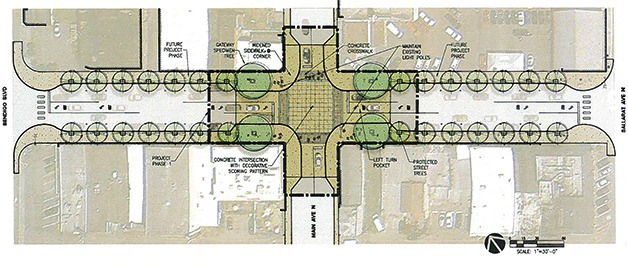Voting to use a December-expiring $350,000 federal grant rather than to lose it, North Bend’s City Council authorized a design contract on the proposed downtown plaza project on North Bend Way, Tuesday, Nov. 4.
The decision, supporting a downsized version of the proposed project, was neither easy for the council, nor unanimous. Councilman Ryan Kolodejchuk cited his concerns about the cost to the city and traffic congestion, and voted against the contract after a discussion of their options. These included giving up the 2011 grant (which had to be committed to a project by the end of December) in hopes of gaining a larger award in the future, spending it on a reduced version of the original proposal, or keeping both the grant and the original proposal, but doing the full project in phases.
“You can’t really shut down (the) street for two summers,” Kolodejchuk said.
Mayor Ken Hearing agreed. “I would prefer not to—no, I’d be dead set against doing this twice,” Hearing told the council before their vote. Two street closures during peak tourism times would be hard on both the businesses and the city’s sales tax revenue, he added.
Most council members spoke in favor of the reduced-scope project, centered on the North Bend Way and Main Street intersection, with new, wider sidewalks, and other pedestrian improvements.
Councilman Jonathan Rosen suggested several changes to pare the reduced project costs further, and recommended using city funds reserved for property acquisition to fully fund the work, “so we get it done, get it done once, so it looks good.”
From the audience, Martin Volken, an Economic Development Commission member, urged the council to proceed with some form of the downtown project. Although he had been hoping for the larger, two-phased approach, he knew that other business owners on the street were concerned about the potential disruption.
“But I think we’ve been disrupting business in downtown for the last 20 years by not doing anything,” Volken said. Vacant storefronts lead to lost business, he noted, and in his talks with other business owners, he found that “Nobody wants to wait another four years, to then hopefully have the budget, to then hopefully do a project.”
Trevor Kostanich, also on the Economic Development Commission, agreed with Volken. He talked about the group’s past efforts to revitalize downtown, and about the message that the council would send to city business owners with its action.
“It’s really important to me that we make the right statement,” he said, urging the council to proceed with the scaled-back project and spend the money the city has already been given.
Public Works Director Mark Rigos told the council he’d re-scoped the plaza project from an earlier estimate of a three-block span and $1.8 million in proposed improvements to the single-intersection effort. The project will cost the city a minimum of $350,000, which is the required match for the federal grant, and would likely worsen traffic congestion on North Bend Way.
The level of service at North Bend Way’s intersections with Bendigo Boulevard and Main Street would both likely drop to “F” during the peak hour of 4 to 6 p.m. by the completion of the project. An F rating represents an average wait of more than 80 seconds at an intersection with a traffic signal, and more than 50 seconds at two-way stops. Currently, the Bendigo intersection (with signal) is rated D, with an average delay of 35 to 55 seconds during peak hours, and Main (two-way stop) is rated E, with an average delay of 35 to 50 seconds. While North Bend Way will retain a lane of travel in each direction plus a center turn lane, Rigos said Main Street would be reduced to the two driving lanes, and no center turning lane.
Congestion relief is not the point of the project.
“It was never our intention to have a high level of service downtown,” said Councilman Alan Gothelf.
Rigos, in a later conversation, concurred. “The goal… is not to improve traffic congestion. It’s to create a more livable, pedestrian friendly downtown.”
With the approval of the design contract, Rigos estimated that the project could be “shovel-ready” by the end of the year. He hoped the work could be completed in 60 days, basically April and May of next year, and with minimal effect on downtown businesses.
“For the most part, downtown will be open,” he said.
The design contracts awarded included $113,953 for the civil engineering firm Tetra Tech, and $40,000 for Cascade Design Collaborative, for assistance with streetscape design elements.



